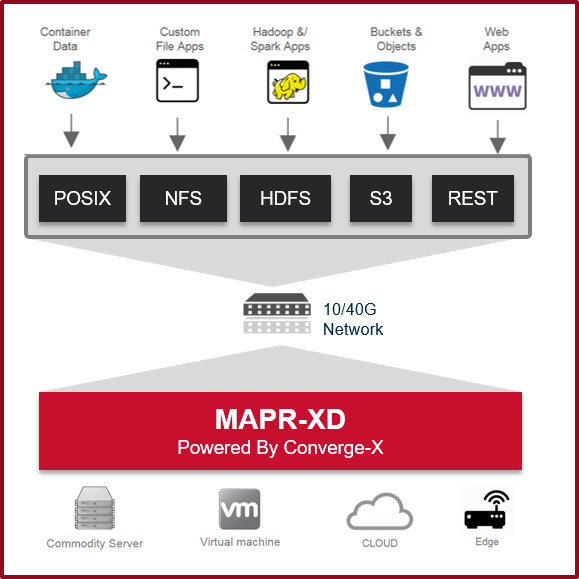 BIG DATA
BIG DATA
 BIG DATA
BIG DATA
 BIG DATA
BIG DATA
In a crowded market for big-data platforms, vendors struggle to find differentiation points. Today’s announcement by MapR Technologies Inc. indicates that it has concluded that the data storage platform is one of them.
That’s the apparent impetus behind MapR-XD, a cloud-scale data store that the vendor says can manage distributed networks of files, objects and containers as a single unit. The file storage platform supports multiple cloud environments with automatic policy-driven tiering that enables organizations to intelligently manage storage platforms according to the the importance of the data.
“We’ve been selling this for five years and have some big customers, so we figured why not productize it?” said Bill Peterson, senior director of industry solutions at MapR. Indeed, the company’s “converged data platform,” which integrates Hadoop, Spark and Apache Drill with real-time database capabilities, global event streaming and scalable storage, has long been a key selling point, but always within the context of an overarching big-data solution.
MapR has lately been trying to mine more value out of its storage capabilities as the Hadoop market has become more cutthroat and valuations of Hadoop vendors have fallen. In February it announced a persistent storage system for containers based upon its distributed file system, and just a month later it made a play for Internet of Things developers with a mini version of its platform that lives at the edge.
Hadoop is only bit player in today’s announcement, behind cloud-like scalability and support for trillions of files or objects in a global namespace. The company isn’t positioning the product as a file server but rather as a fabric for big data exploration that satisfies enterprise needs for unified security, data protection and high availability across diverse data types. In the spirit of big data, however, it supports only file storage, not block storage, to enable access to metadata.
Specifically, the company is targeting data silos that have popped up as the big data phenomenon has taken hold. The focus is on managing unstructured data and on accessing it from a variety of sources, including network file system, the Hadoop file system, Amazon Web Services Inc.’s S3 and the open Portable Operating System Interface, or Posix. The product supports programmable application programming interfaces that can read to and write from any combination of those four platforms. “This is an opportunity for companies to get at data they’ve perhaps maintained for a long time, but have never been able to use,” Peterson said.
He stressed that MapR-XD doesn’t mark the company’s entry into the cloud storage business but rather is “an enabler for a multi-tiered model.” As organizations have adopted big data, they have also built geographic silos in order to maintain proximity to analytics engines. In addition, more data is being stored at the edge. MapR said its platform is enterprise-grade, providing features like high availability, data protection and no-single-point-of-failure disaster recovery along with distributed metadata, point-in-time snapshots and distributed mirroring. It supports any combination of disk and flash storage along with graphical processing units that are gaining favor as co-processors in massively parallel environments.
Automated capabilities include logical partitioning, parallel processing for disparate workloads, bottleneck avoidance and input/output shaping and optimizations for performance optimization across a cluster. The native Posix client provides up to 10 times the performance of a typical NFS gateway, the company said.
Also included is a secure container client for providing containers with access to persisted data. The client supports both legacy and containerized event-based microservices applications, as well as multiple data types such as files, objects, containers, database and event streams. It works with popular open-source container software schedulers such as Kubernetes, Mesos and Docker Swarm across on-premises, multi-cloud and edge infrastructures.
Pricing wasn’t announced.
THANK YOU